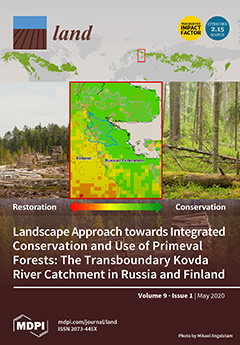Resources
Displaying 1476 - 1480 of 2258Smart Villages: Where Can They Happen?
The European Union is actively promoting the idea of “smart villages”. The increased uptake of new technology and in particular, the use of the internet, is seen as a vital part of strategies to combat rural decline. It is evident that those areas most poorly connected to the internet are those confronted by the greatest decline. The analysis in this paper is based on Poland, which at the time of EU accession had many deeply disadvantaged rural areas. Using fine-grained socio-economic data, an association can be found between weak internet access and rural decline in Poland.
Analysis of Land-Use Change in Shortandy District in Terms of Sustainable Development
The suburban territories of large cities are transitional zones where intensive transformations in land use are constantly taking place. Therefore, the presented work is devoted to an integrated assessment of land use changes in the Shortandy district (Kazakhstan) based on an integrated study of the dynamics of land use and sustainable development indicators (SDIs). It was found that the main tendency in the land use of this Peri-urban area (PUA) during 1992–2018 is their intensification, through an increase in arable lands.
Agricultural Greenhouse Gas Emissions: Knowledge and Positions of German Farmers
Climate mitigation targets must involve the agricultural sector, which contributes 10%–14% of global anthropogenic greenhouse gas (GHG) emissions. To evaluate options for implementing mitigation measures in the agricultural sector, farmers’ knowledge, positions, and attitudes towards agricultural GHG emissions, their accounting, and reduction need to be understood. Using an online survey, we asked 254 German farmers about their motivation to reduce GHG emissions and their acceptance of possible regulation schemes.
Spatial Planning, Urban Governance and the Economic Context: The Case of ‘Mehr’ Housing Plan, Iran
With the increasing concentration of population and economic activities in metropolitan regions, dwelling shortages and housing quality have become critical issues in urban management. Town plans considering social, economic, political, and cultural features of local communities have been developed with the aim of supporting housing, especially in emerging economies. In Iran, the ‘Mehr Housing’ Plan has been considered as one of the most relevant strategies for social housing since the 2000s.
Key Roles for Landscape Ecology in Transformative Agriculture Using Aotearoa—New Zealand as a Case Example
Aotearoa—New Zealand (NZ) is internationally renowned for picturesque landscapes and agricultural products. Agricultural intensification has been economically beneficial to NZ but has implications for its clean green image. Contaminated waterways, high carbon emissions, and extensive soil erosion demonstrate the downside of high stocking rates and land clearing. Transformative farming systems are required to address the challenge of balancing production with the environment.


